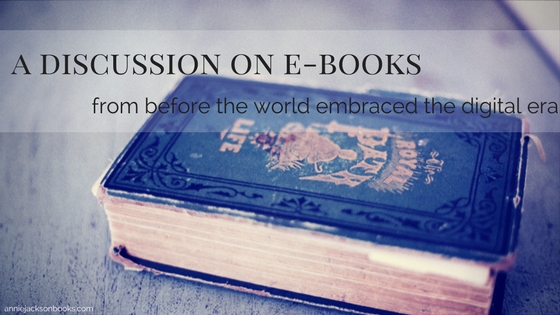I don’t understand why the publishing industry hasn’t embraced e-books. I don’t know if anyone does, actually. From all appearances they have a product with virtually no cost to produce (since authors are profit participants and not actually paid for their time, even with hard copy). Why would anyone resist that?
There are, in fact, several other factors at play. This is an interesting article that explains the price discrepancy between e-books and hard copy (which five major publishers and Apple are currently being sued over). The bottom line is publishers still make more money off hard copy per book.
But that seems, to me, a short sighted equation.
- First of all, it ignores the disparity created by volume. You can’t loan an e-book. For the most part, you can’t check an e-book out of the library. With the ease of acquiring an e-book and the convenience of having the material on hand almost anywhere, if a book is reasonably priced most people would just buy an e-book when they wouldn’t take the time or effort to go to a bookstore, or order it online, or visit their library. Titles that consumers only have a passing interest in would be a revenue source rather than an idle thought.
- Second, it completely ignores the cost to produce a book. Granted, I don’t know the actual cost to produce hard copy: the paper, ink, binding and shipping to distributors. This article estimates that the cost to produce a book is about $1.50 or $2.00. Not much, but if the profit discrepancy between an e-book and hard copy is approximately $5 or less – that $3.50 or so could reasonably be offset by the increased volume of e-book sales.
The admitted weakness of this point is that publishers have costs not directly related to the production of a single title. But they also make more money than any other entity in the sale of a book. I feel, perhaps naively, that if they manage the digital aspect of their industry well, they make money and operating costs become negligible to the equation. - Third, and possibly most significantly, it turns a blind eye to history. The revolution in the music industry showed us that consumers want content. Most are willing to pay for it; almost none are willing to wait for a stodgy corporation to recognize that. (I’ve even seen discussions online debating the moral viability of buying a less expensive hard copy and then – having spent money on the product – illegally downloading the e-book). Whether right or wrong, whether we like it or not, consumers feel entitled to content. If you refuse to recognize that and provide it you’re only losing money in the long run. Certainly, take every measures to protect content from piracy. And charge a fee because artists should be paid for their work. Then if you make it easy for consumers, you’re in control – riding the wave of change if you’ll allow me a cliched metaphor. But if you make it difficult for consumers to acquire content (say by pricing it too high) then you’re only losing money.
The bottom line is some readers like e-books a lot. Because of the ease and portability (and the likely prevalence of tablets) it is where the industry is going. Publishers can embrace that, structure their business so that they make money by giving readers what they want, even fuel that conversion from hard copy to e-book and make even more money in the process. Or they can alienate readers, resist change and lose control of the evolution of their industry.
I know it takes a certain amount of vision to see the opportunity in change rather than the difficulty of transformation. But isn’t that better than resisting the inevitable?
ETA: If I was an author with an out of print title, I’d absolutely self-publish an e-book version. Why let it gather dust when you are no longer at the mercy of a publisher? Especially when you get a larger percentage of a self-published e-book.
ETA2:This may be it’s own post some day but for now it fits here. I don’t mean to imply in this that e-books will replace hard copy. I think they’ll supplement it the way mass market paperbacks supplement the hard cover. I think there’s room for several formats that give the consumer the product they want at a price they’re comfortable with.
